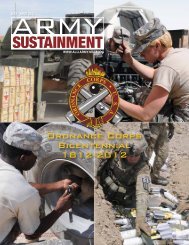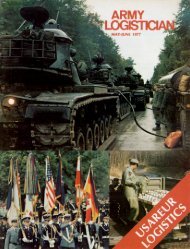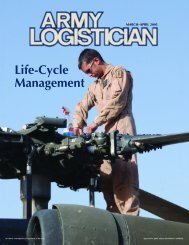Do Stryker Brigade Combat Teams Need Forward Support ...
Do Stryker Brigade Combat Teams Need Forward Support ...
Do Stryker Brigade Combat Teams Need Forward Support ...
You also want an ePaper? Increase the reach of your titles
YUMPU automatically turns print PDFs into web optimized ePapers that Google loves.
stifled the incentive to do anything more than the minimum<br />
requirement. It is hard to overcome those habits<br />
in a short period.<br />
The Iraqis should be taught higher-end staff skills.<br />
They have to learn better planning skills and how to<br />
coordinate internal and external activities. Lacking<br />
planning skills is a great inhibitor to more efficient<br />
operations. The Iraqis will have to plan and coordinate<br />
their own support missions in the future, so those skills<br />
will benefit them.<br />
U.S. troops are constantly relearning how to deal with<br />
the Iraqis. As the Iraqis grow in their capabilities, we<br />
have to reexamine how we deal with them. The cultural<br />
differences between Iraq and the United States also must<br />
be taken into consideration. One of these differences is<br />
the U.S. love affair with technology. Many people in<br />
the U.S. Army cannot or will not do anything without a<br />
computer. Nowadays, the average U.S. Soldier lives on<br />
a computer. However, the average Iraqi is only just now<br />
becoming acquainted with computers. We have to avoid<br />
computer-dependent solutions.<br />
As more and more Iraqi units are moving around their<br />
country and taking on more responsibilities, the U.S.<br />
Army has to reexamine how it communicates with the<br />
Iraqi Army. In the past, the Army just contacted the U.S.<br />
MiTT that was working with that Iraqi unit. Toward<br />
the end of my tour, the unit we worked with grew in its<br />
capacities. It frequently had several convoys on the road<br />
at the same time. The MiTT is not big enough to be with<br />
all the convoys at the same time. Iraqi units have very<br />
few communications devices, and those they do have do<br />
not work with U.S. communications equipment. Those<br />
things make it very difficult for the MiTT members to<br />
communicate with Iraqi units. Those issues are being<br />
worked out daily. At most U.S. bases, Iraqi Army units<br />
that come on base are searched and funneled into certain<br />
gates that have more security. I think most people can<br />
imagine what message would be sent if you invited a<br />
friend over and then propped him up against a wall and<br />
searched him. I saw this done a few times.<br />
Things in the Iraqi Army are improving, though. I<br />
saw some drastic changes in the year I was living with<br />
the Iraqis. When I started working with the 4th MTR,<br />
the Iraqi Army had no headquarters and no system set up<br />
to handle anything on an army-wide basis. When I left,<br />
they had a rudimentary staff system set up for all major<br />
areas. I saw that change in the course of just 10 months.<br />
The Iraqis have set up contractor-run dining facilities<br />
at most of their bases, which seem to be working well.<br />
They have set up a local purchase program that is meeting<br />
some of their needs. The Ministry of Defense is now<br />
tackling issues like future equipment acquisition.<br />
People forget that scores of Iraqi units also participated<br />
in the big surge in Baghdad and in the Basra area. These<br />
ARMY LOGISTICIAN PROFESSIONAL BULLETIN OF UNITED STATES ARMY LOGISTICS<br />
units moved in and out of the area from all over Iraq<br />
using Iraqi vehicles. They figured out their own ways to<br />
support those units. In the beginning of my tour, it was<br />
hard for a unit from one part of Iraq to get support in<br />
another area. When I left, the Iraqis had figured out ways<br />
to support the 4th MTR on missions in Baghdad.<br />
Unwritten rules tend to shape<br />
everything Iraqis do. We in the<br />
United States might say they are<br />
bound to the past through these<br />
cultural mores. They would<br />
say they are respecting the past<br />
through those mores.<br />
The big issue for the U.S. Army now is how to move<br />
the Iraqi Army along. If we do too much, it will shut<br />
down their efforts. The U.S. answer may not be the<br />
best answer for them. That answer might not be practical<br />
for the Iraqis for a variety of reasons. I also think<br />
there is a pride factor. They want help but do not want<br />
to be seen as beggars. Interactions with them also<br />
should be constructed with that in mind.<br />
I don’t have any easy answers for quickly fixing the<br />
Iraqis’ logistics problems in a long-term, sustainable<br />
way, but something has to be done. If the Iraqi Army is<br />
going to move to the next level, it has to master logistics<br />
and retool processes to handle more-complex logistics.<br />
Right now, the Iraqi Army is very dependent on the<br />
U.S. Army for certain parts of its logistics program. I<br />
know the U.S. Army is trying to deal with that. Some<br />
plan should be laid out quickly. The past sacrifices of<br />
the U.S. Army would be for naught if we do not help<br />
the Iraqis master logistics. Any solution must be Iraqi<br />
in nature. U.S. responses will have to be general and<br />
establish broad program parameters. We will have to<br />
let the Iraqis figure out the details if the solution is to<br />
last. I acknowledge that will take a lot of time.<br />
Li e u t e n a n t co L o n e L th o M a S M. Ma G e e, uSar, iS<br />
an in t e r M e D i a t e LeveL eD u c a t i o n i n S t r u c t o r f o r t h e<br />
11th battaLion, 104th DiviSion, in in D e p e n D e n c e,<br />
MiSSouri. he h o L D S a bacheLor’S D e G r e e in buSineSS<br />
aDMiniStration f r o M t h e univerSity o f KanSaS a n D<br />
a MaSter’S D e G r e e in p u b L i c aDMiniStration f r o M<br />
t h e univerSity o f MiSSouri. he iS a G r a D u a t e o f<br />
t h e MiLitary po L i c e officer baSic a n D aD v a n c e D<br />
courSeS, t h e co M b i n eD ar M S a n D ServiceS Staff<br />
Sc h o o L, a n D t h e ar M y co M M a n D a n D GeneraL<br />
Staff coLLeGe.<br />
19







